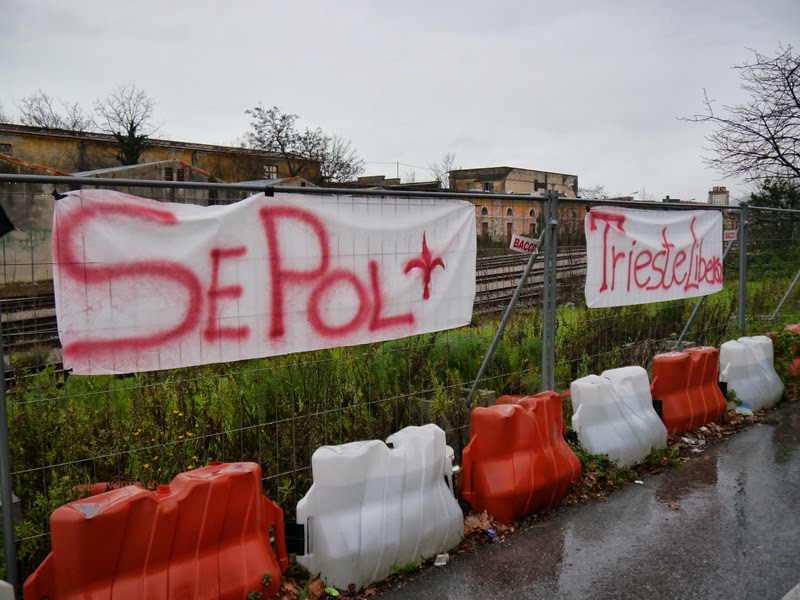
“Se Pol” means “We can” in Triestine dialect. The other banner says “Free Trieste”
ON APRIL 9th, 2014 THE JUDGE WHO RECOGNIZED THAT “ZONE A” OF THE FREE TERRITORY WAS UNDER TEMPORARY ADMINISTRATION UNTIL 1975 MUST EVALUATE THE “TREATY” OF OSIMO.
On 19 March, 2014 for the first time, an Italian judge recognized that in 1954 “Zone A” of the Free Territory of Trieste (the present-day FTT) did not return to Italy. Indeed, it was under Italian administration in accordance with a 1954 agreement stipulated by the Governments of the US, of the UK, of Italy and of former Yugoslavia.
This agreement is the Memorandum of Understanding regarding the Free Territory of Trieste. From 1947 to 1954, it was the British-US Government to administer Trieste.
When the Allied Military Government of the Free Territory of Trieste (AMG FTT) was dissolved, its duties were taken up by the Italian Government. The Italian Government appointed a local, civilian representative in charge of continuing the AMG FTT’s good administration (LINK) but soon he “forgot” to do so.
The Court’s March 19th decision is an important one.
It’s been obtained with a long legal battle, I started it on 14 December 2011 raising the first exception of the absolute lack of Italian jurisdiction over “Zone A” of the FTT.
But this was not the first step: it all started in July 2011, when I preseded the European Commission with an international complaint (HERE): it was about environmental pollution in the present-day Free Territory of Trieste, and about the breaches of law regarding the legal status of its International Free Port.
In August 2011 I declared my citizenship of the FTT. And this is also the first time that Trieste’s EU membership was put into question.
It’s been a long way.
Question Trieste made it to the European Parliament. And many more citizens followed my example, becoming aware of their rights.
However, Criminal Proceeding No. 854/10, in which Judge Piero Leanza expressed himself on 19 March, represents a breaking point for this very important, long-forgotten issue.
For the first time a person, not the defendant, but the offended party presented an exception on jurisdiction, seeking justice from in the name of the Free Territory of Trieste.
It is a request based on compliance with international Treaties, including the 1954 Memorandum of Understanding: again, the Italian Government committed to continuing the good work of the Allied Military Government.
And it was the official translation of the MoU, ordered by the first judge in charge of this proceeding, to confirm a truth that many Italian nationalists denied for decades: Trieste, Capital city of the present-day Free Territory and its international Free Port do not belong to Italy. At least, the judge adds, not until 1975, when the Treaty of Osimo was signed.
On 9 April I am once again be before Court, before the same judge, for another criminal proceeding.
This time I am the defendant, once again presenting an exception of lack of jurisdiction. It is time to prove that the bilateral “Treaty” of Osimo confirms the 1954 MoU and cannot amend the multilateral 1947 Treaty of Peace.
This is absolutely certain.
It is not easy explaining how many sacrifices derive from bearing the weight of such an hard struggle on my shoulders. I’m telling this now, because I am often asked why do I follow this road. In a material world where every action is evaluated out of their opportunistic calculations, it is hard making someone understand that a human being can be guided by values that are far more noble than material gains.
If you simply explain that you are supporting this battle in the name of the universal values of justice, equality and tolerance, for the sake of common good, which is the Planet we live on, they stare at you in disbelief, as if you were out of mind, an alien in this society on the way of self-destruction.
They criticize you, they tell you can’t become a leader. But what is a leader? If a leader has to be an hypocrite, ready to compromise to archive his own goals, I’d rather be an ordinary person. But a loyal person. One that is unafraid to stand for what is good. To pick a side in this eternal, constant conflict, which is the foundation of human life and history, currently in an extraordinary acute, paradoxical, critical phase.
Translated from Blog “Ambiente e Legalità” – “Environment and Legality” by Roberto Giurastante
